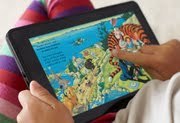Three Traits That Make The Kindle Fire Competitive
Source: Matt Hamblen
 The Kindle Fire tablet, announced by Amazon.com on Wednesday, has three traits that make it competitive in a crowded tablet market: a low $199 price, a fast browser called Amazon Silk, and access to an abundant ecosystem of movies, music, apps, and books.
The Kindle Fire tablet, announced by Amazon.com on Wednesday, has three traits that make it competitive in a crowded tablet market: a low $199 price, a fast browser called Amazon Silk, and access to an abundant ecosystem of movies, music, apps, and books.
On price
The Fire, with its 7-in. color touch screen at 1024 x 600 resolution, is lightweight at 14.6 ounces and functions over Wi-Fi only. Those features put the Fire in close contention with Barnes & Noble's Nook Color, a 7-in. e-reader and browser-enabled device that sells for $249.
Most will try to compare the Fire with the Apple iPad 2, the 9.7-in. tablet on Wi-Fi with a price tag that starts at $499. The iPad 2 is already the runaway market leader, with more than a 70% market share, according to Gartner and others.
Related Slideshow: Meet Amazon's Four New Kindles

Amazon CEO Jeff Bezos didn't mention those two competitors in his introduction of the Fire and three new Kindle e-readers priced below $149 on Wednesday, except to say that Amazon is offering "premium products at non-premium prices." Fire will ship on Nov. 15, although orders are now being taken online.
Jack Gold, an analyst at J. Gold Associates, called the Fire's $199 price "groundbreaking" even if it doesn't give Amazon much room for a profit margin. "They don't have to make much profit on the device if they can sell books, music, videos and more," he added.
(UPDATE: Amazon Kindle Fire First Impressions: Solid but Limited)
Bob O'Donnell, an analyst at IDC, said the $199 price "is low enough to be an impulse buy for some people. Even people with iPads may decide to buy the Fire." Amazon won't have to worry about incurring added costs for retail sales since it will sell direct, and the company might not lose profits on the $199 price, he said.
Still, direct sales mean users won't be able to handle and test the Kindle Fire in a store, O'Donnell noted. That factor didn't drag down earlier Kindle sales, but it could matter for the Kindle Fire, he said.
  Aside from its impact on competing e-readers, O'Donnell said the Android-based Fire "will make life incredibly difficult for other Android-based tablet vendors" such as Samsung with its Galaxy family of tablets. Aside from its impact on competing e-readers, O'Donnell said the Android-based Fire "will make life incredibly difficult for other Android-based tablet vendors" such as Samsung with its Galaxy family of tablets.
Allen Weiner, an analyst at Gartner, said the "Fire competes directly with the Nook Color and not really the iPad." But at $50 less than the Nook Color, the Kindle Fire allows for streaming media in ways that the Nook Color cannot, he added.
"Also, you can't compare the 7-in. Kindle Fire with the [9.7-in.] iPad," Weiner said. "Magazines will look better on the iPad mostly because of real estate. You can do wonders with a 7-inch screen, but you can't make it bigger."
"I think Kindle Fire is about Amazon saying, 'This is the market we created and we want to take it back and own it,'" Weiner said.
On the split browser
Amazon called Silk "a revolutionary, cloud-accelerated browser that uses a 'split browser' architecture to leverage the computing speed and power of the Amazon Web Services cloud."
Many analysts compared what Amazon is doing by splitting browsing between the Fire device and the cloud to what happens with the Opera Mini browser. Amazon will rely on the computing speed of its Amazon Web Services cloud, which is basically a massive server fleet also called the Amazon Elastic Compute Cloud (EC2).
 The biggest question about Silk is how much faster browsing will be, analysts said. "The Silk browser conceptually looks good, but the real question is: Does it work?" O'Donnell said. The biggest question about Silk is how much faster browsing will be, analysts said. "The Silk browser conceptually looks good, but the real question is: Does it work?" O'Donnell said.
Gold said the split browser uses a traditional phone-type Web browser methodology by rendering the websites in the cloud and then only pushing webpages to the devices. "It should make the user browsing experience fast," he said.
Weiner said the Kindle Fire and its cloud browsing, as well as its highly customized Amazon version of Android, could raise concerns from some users that tablet makers are further creating silos of data and devices that don't interact with other clouds and devices on the market. He explained that a different Android device won't touch a user's data in the Amazon cloud or do many of the things Amazon is doing in the Fire.
On the Amazon app ecosystem
Amazon's online marketing channels will give Kindle Fire users access to music, movies, books and apps. The concept sounds impressive, partly because Amazon has had years of experience selling merchandise online and has become the biggest bookseller in the world, Weiner noted.
Gold said the entire Amazon ecosystem of products could also be attractive to content developers, but only if Amazon "doesn't have the heavy-handed approach of Apple."
In fact, Weiner said Amazon's approach to marketing books, magazines and other printed materials could be the biggest advantage that the Kindle Fire has over the iPad. "Apple can't compete with Amazon on publishing," Weiner said. "Publishing is the iPad's Achilles' heel."
Weiner predicted Amazon won't charge publishers the 30% cut that Apple charges publishers. "Apple really turned off the magazine publishers by insisting on 30% of revenue," he said. "Amazon wants to really play nice with the magazine publishers, and it won't take much below 30% to do better than Apple."
| }
|